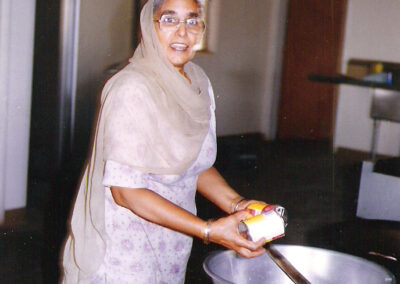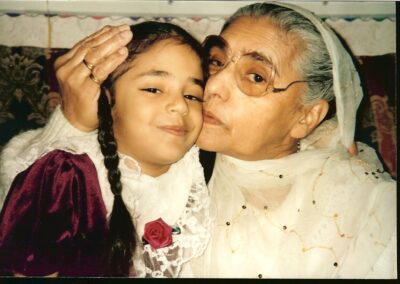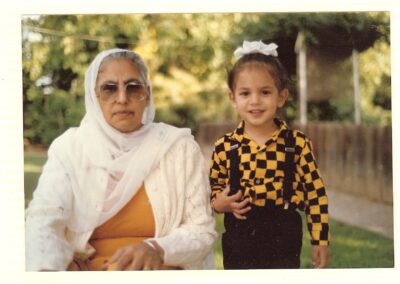Amar Kaur Everest
Amar Kaur Everest (March 10, 1924 – February 2, 2008) was the only daughter of five children born to Arjan Singh and Prem Kaur in Rampur, Punjab. She was the wife of Hari Singh Everest, who was the first Punjabi teacher in a Yuba City school, as well as a writer and community leader. After she arrived in Yuba City in 1967, she played an active role in performing seva at the local Gurdwara since it opened in 1970.
Her youth in Punjab was not easy. Her mother died when she was about four years old, and she was raised by her grandmother. Due to her grandmother’s advanced age, Amar Kaur learned to cook as a young girl, making rotis for her four brothers. She formed an unusually close relationship to her brothers due to the maternal care she gave them when they were children.
Amar Kaur likely took Amrit at about the same time as her husband, Hari Singh, before their wedding. In a marriage arranged by their grandfathers, the couple wed in Amar’s home village on June 7, 1938. Amar was only 14 years old and her husband was eight years older. As a result of her young age, she appears to have waited six years before living with him as a married couple.
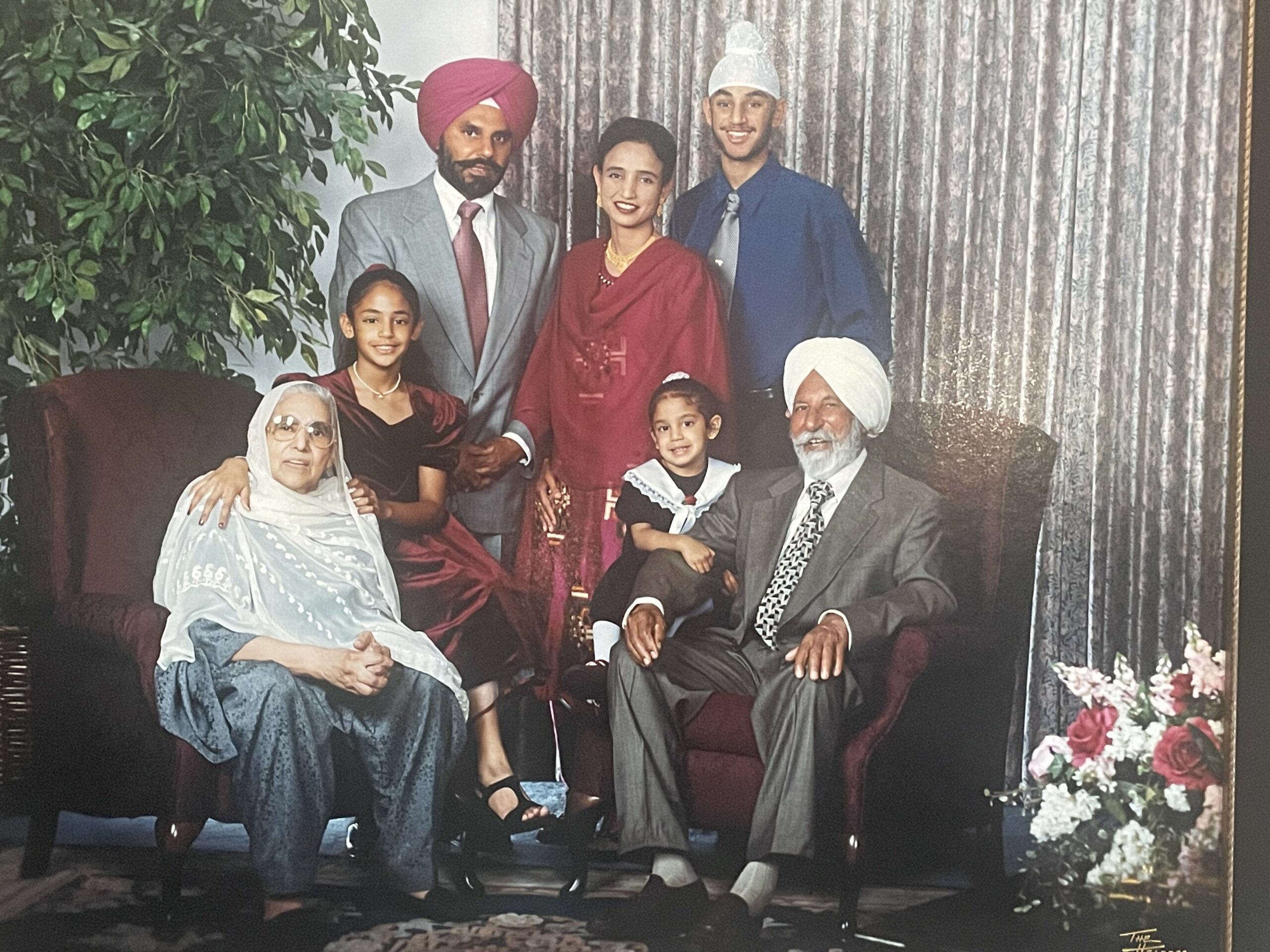
Amar with her family, Yuba City, 1998.
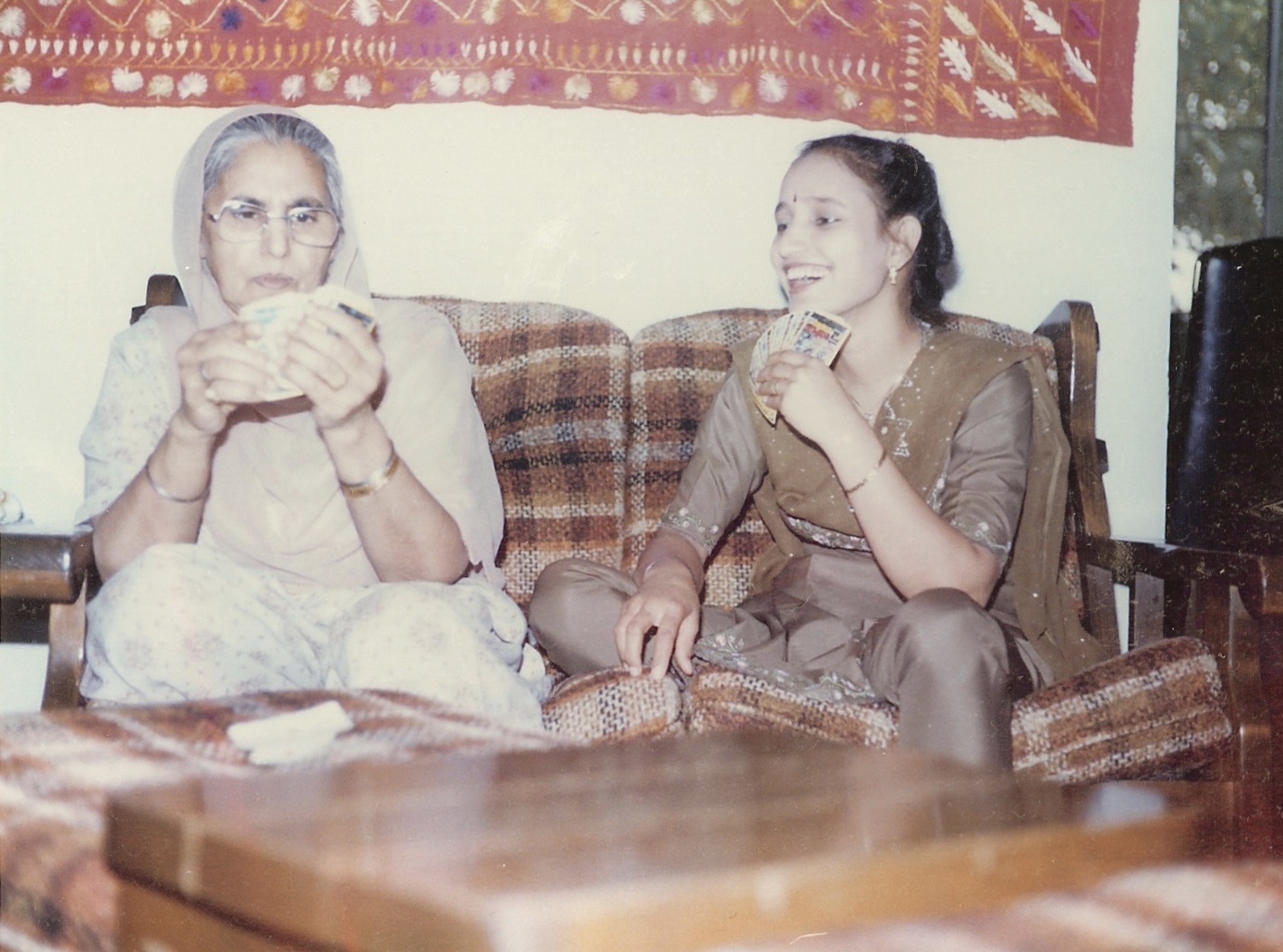
Amar with daughter-in-law, Surinder, Yuba City, c 1986.
In 1944, Hari Singh Everest was posted in Shimla after he joined civil service on behalf of the British Indian government (after independence, he served on behalf of the Indian government.) Amar Kaur likely joined her husband in Shimla around 1944. Three years later, they had their daughter Manjit in 1947, and their son Paramjit in 1954. After her husband left for America in December 1954, Amar Kaur relocated to Buland Shahar in Uttar Pradesh 40 miles away from Delhi. Amar Kaur and her children lived with her brother and his children on their farm.
After 13 years of living far apart, her husband was settled enough to sponsor Amar Kaur and their two children to join him in America. However, her brothers cherished their sister, and they resisted the idea of losing her. Her brothers eventually relented when it became clear that Hari Singh Everest wasn’t going to return to live in India. Paramjit, Amar Kaur’s son, recalls a remarkable gesture: “I remember that one day before leaving India, my uncle washed my mother’s feet and drank the water in deep respect for my mom.” In South Asia, this act of love and devotion is the highest form of reverence usually reserved for saints. It is not commonly performed in daily life. This act is extolled in the Guru Granth Sahib: “ਚਰਨ ਸਾਧ ਕੋ ਧੋਇ ਧੋਇ ਪੀਉ” “Wash the feet of the holy and drink the water.” (GGS: 283).
Paramjit vividly remembers the scene of their departure from Palam airport (now Indira Gandhi airport) in Delhi in the spring of 1967. Amar Kaur and her two children ascended the outdoor stairs to the metal landing before boarding their Pan Am flight to Tokyo. As they turned back around, looking over their shoulders at the crowd standing on the tarmac below, they saw a busload of family members, friends, and neighbors wish them farewell. Amar Kaur and her children’s journey to America was arduous with frequent stops for refueling in Tokyo, Honolulu, and finally, San Francisco. Her son, Paramjit, recalls feeling intensely hungry throughout their long journey. They had packed nothing to eat. As Amritdhari Sikhs, they didn’t feel comfortable eating the meals served during their flights. When they stopped in Honolulu to clear immigration, they felt reluctant to leave the plane. Finally, Amar Kaur and her children ventured out to drink pineapple juice. Hari Singh (Amar’s husband) and his friend, Ajmer Singh, welcomed his wife and two children to America when they arrived on May 5, 1967 at San Francisco airport. After driving two hours to Yuba City, Paramjit remembers eating the home-cooked dinner at Ajmer Singh’s house with great enthusiasm, including dal, sabji and more than a few rotis.
In Yuba City, the family of four lived in a one-bedroom apartment on Redding Avenue for seven years. Despite its small size, the Everest apartment became a hub for religious gatherings of 25 or more due to the presence of the Guru Granth Sahib. The Sangrands (monthly prayer gatherings) were hosted in the homes of a small group of families, such as Ajmer Singh Bains, Swarn Kaur and Karm Singh Johl, Ganda Singh Heir, Khazan Singh and Sham Kaur Johl, Puna Singh and Nand Kaur, the Cheemas, and other devout Sikhs. The Sangrand programs involved singing the Barah maha, a sacred song composed by Guru Arjan that charts the soul’s yearning for and ultimately its union with the divine over the course of the year. The program was held at the start of each month of the traditional Sikh calendar, each capturing a mood in the progression of the seasons and the metaphysical journey of the soul. Local Sikhs in Yuba City saw the Sangrand as a tool for creating a community of faith and connecting the sangat with the divine. The Sangrands also helped build the momentum towards raising funds to establish a local Gurdwara in Yuba City as a result of the growing Sikh population in the years after the watershed 1965 Immigration Act.
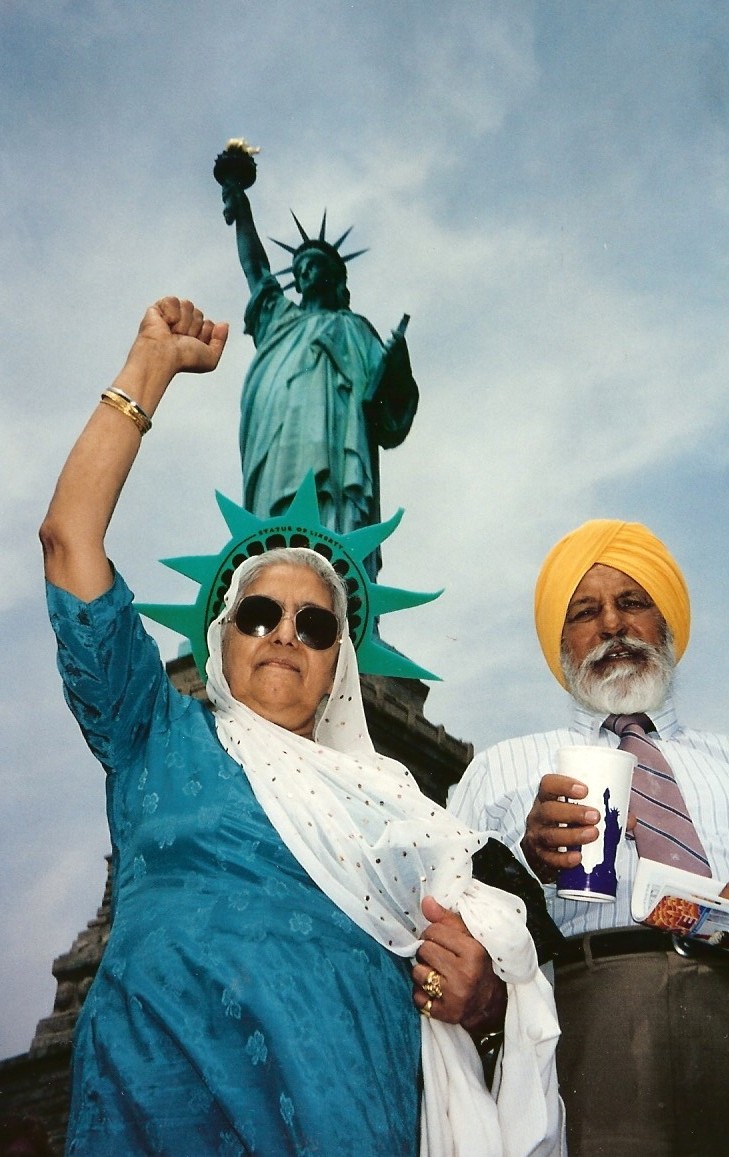
Amar with husband, Hari Singh Everest, New York, 1995.
Amar Kaur dedicated a great deal of her life to performing seva (community service) in the Yuba City Gurdwara after it opened in December 1970. With only a few years of informal education at the local Gurdwara, she would read and recite her daily nitnem (five prayers) from her Gutka (an abridged version of the Sikh scripture). A devout Amritdhari Sikh, she would wake up early each morning to recite her prayers before sunrise. Afterwards, she would visit the Gurdwara before breakfast. Together with close friends, she donated countless hours of seva preparing langar and cleaning the Gurdwara. Her intimate circle of female friends and family members included Sham Kaur, Sant Kaur Grewal, Swarn Kaur Johl, Harbhajan Kaur Takher, Gurmit Kaur Takhar, Harbhajan Kaur Purewal, Preetam Kaur Purewal, Basanti Kaur Johl, Darshan Kaur Johl, and other women. These women would prepare all of the food for local Sikh weddings.
Amar Kaur contributed her specialties and talents for the community. Known for her delicious Indian sweets, Amar Kaur often prepared jalebi and ladoo for the langar kitchen and for special religious and social occasions. She prepared the kara prashad, the holy food served to all visitors in all Gurdwaras. She even taught the local priest how to prepare the prashad. She performed seva for decades until her Alzheimer’s condition prevented her from doing so. An excellent seamstress, she would sew kacchera for local Amritdhari Sikhs, which was one of the articles of faith that was difficult to obtain in Yuba City at that time. She also sewed Punjabi outfits.
During harvest season, she and her son, Paramjit, would pick peaches, walnuts and prunes together. She would pick the low-hanging fruit while he would empty her buckets into larger bins. “We became a very good team,” her son Paramjit recalls, “as we could fill up 11 to 12 bins [per day].” Each bin contained a half ton of peaches!
Amar Kaur was the mother of two children: Manjit Kaur Everest-Dheri (born in Rampur in 1947) and Dr. Paramjit Singh Everest (born in Shimla in 1954).
Photos courtesy of the Everest family.
Source: Interview with Dr. Paramjit Singh Everest by Nicole Ranganath, Yuba City, July 29, 2022, with extensive input from Manjit Kaur Everest Dheri.

